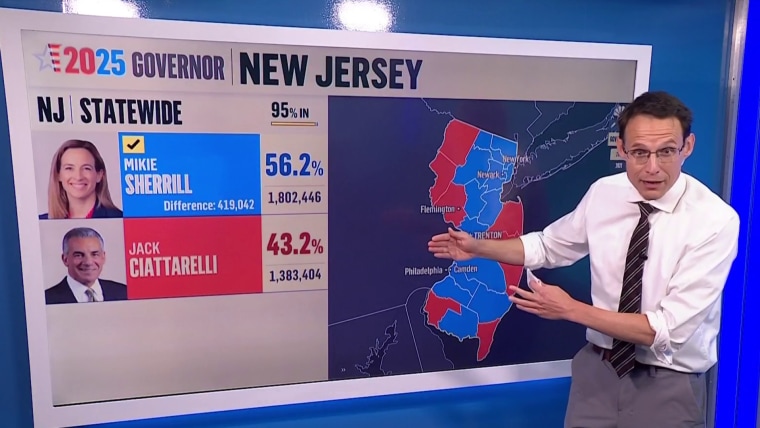It’s not in President Donald Trump’s nature to accentuate the negative — at least not when it comes to his own performance or plans — and in the current moment, that has put him at risk of sounding out of touch with Americans who are struggling to make ends meet.
“We had the greatest economy in the history of our country,” Trump said of his first term in an interview with Norah O’Donnell for CBS’ “60 Minutes” a week ago. “But my second term is blowing it away.”
Two days later, voters blew away Republican candidates up and down the ballot in Virginia and New Jersey, results that reinforced NBC News polling showing that the vast majority of voters — about two-thirds — think the president hasn’t lived up to his promises to curb inflation and improve the economy. The common watchword for Democratic candidates who won on Tuesday — both progressives and centrists — was “affordability.”
Look no further than Trump's predecessor to see the peril for the president. Early in his single term, President Joe Biden ignored inflation, then his administration dismissed it as a “transitory” effect of government spending during the Covid-19 pandemic, before scrambling to minimize the political fallout of losing trust with the public.
For Trump, who has described himself as a “cheerleader” for the country, his handling of the substance and messaging around affordability amounts to a bet that he’s on the right track — and can prove it quickly — even if most American voters don’t see it that way right now. Biden thought the same.
“Trump has an enormous gamble,” said Newt Gingrich, a former House speaker and a Trump ally. He is betting that his economic policies — including tariffs, tax cuts and investments in the U.S. — will combine to create a “boom of extraordinary proportions” by next summer, Gingrich said in an interview.
“If that’s true, Republicans are going to have a very good 2026,” Gingrich said of next year’s midterm elections. “If it’s not true, Republicans are going to have a very tough 2026.”
Like Trump, Biden argued that the broader economy was strong, even as taxpayers suffered. And like Trump, Biden watched his party’s fortunes change at the ballot box a year after his own election.
“As our economy has come roaring back, we’ve seen some price increases,” Biden said in July 2021. “Some folks have raised worries that this could be a sign of persistent inflation. But that is not our view. Our experts believe, and the data shows, that most of the price increases we’ve seen are expected to be temporary.”

In November of that year, 12 months after Biden won Virginia over Trump by 10 percentage points, Republican Glenn Youngkin won the state’s governorship by 2 percentage points. On Tuesday, Gov.-elect Abigail Spanberger, a Democrat, won Virginia by about 15 percentage points. NBC News exit polls showed that the economy was the top issue for 48% of voters — more than double the 21% who picked health care, which was the second-highest-ranking topic.
Trump, who is collecting hundreds of millions of private dollars to build a White House ballroom and who hosted a “Great Gatsby”-themed Halloween party in the middle of the ongoing government shutdown, said this week that the costs of everyday life are not something he wants to address.
“The reason I don’t want to talk about affordability is because everybody knows that it’s far less expensive under Trump than it was under ‘Sleepy Joe Biden,’ and the prices are way down,” he said of his predecessor in remarks to reporters last week.
On Sunday, Trump continued his cheerleading, but he also revived an idea he first proposed in July, to send out tariff rebate checks of $2,000 per person, excluding high-income earners. Trump did not include more details on who would qualify in his social media post.
"People that are against Tariffs are FOOLS! We are now the Richest, Most Respected Country In the World, With Almost No Inflation, and A Record Stock Market Price. 401k’s are Highest EVER," he wrote.
Trump is frustrated because he doesn’t believe he’s getting the credit he deserves for efforts to bring down prices, said one senior White House official who conceded that the administration is not doing a good enough job of communicating on affordability.

It’s clear that other Republicans are taking a cue from voters. In announcing her bid for governor of New York on Friday, Republican Rep. Elise Stefanik put the issue of affordability front and center. Rather than blame Trump, with whom she is close, Stefanik drew a bead on Democratic Gov. Kathy Hochul, who is seeking re-election.
“The No. 1 issue is affordability,” Stefanik said in an interview with WHAM radio’s Bob Lonsberry. “New York is the most unaffordable state in the nation because of Kathy Hochul’s leadership.”
And even if Trump won’t acknowledge it, his aides say that the White House is paying attention to the squeeze that families across the country say they’re feeling.
“The president is very keyed in to what’s going on, and he recognizes, like anybody, that it takes time to do an economic turnaround, but all the fundamentals are there, and I think you’ll see him be very, very focused on prices and cost of living,” White House deputy chief of staff James Blair told Politico.
But that, too, presents a messaging challenge for Trump, who is presiding over consumer prices that rose 3% in the 12 months ending at the close of September. He has the biggest megaphone in the country, and his own words — which sound a lot like Biden’s — may drown out anything his aides say.
Many Democrats who served in the Biden White House remember a president who disagreed with voters on the strength of the economy and paid a price for failing to acknowledge the sentiments of the electorate.
“The economic statistics may be great, and in President Biden’s case they were,” Democratic strategist Adrienne Elrod said in an exchange of text messages. “But when prices are too high and the messenger keeps saying ‘No, you’re wrong, the economy is actually fantastic,’ the messenger starts to lose credibility with voters.”
Elrod, who worked for Biden on the campaign trail and in the White House, said Trump is making the same mistakes as Biden and Vice President Kamala Harris, who took his place at the top of the Democratic ticket in 2024.
“You have to meet the voters where they are — never forget President Clinton’s effective use of the line ‘I feel your pain,’” she said. “Our failure to do that in 2024 is ultimately one of the reasons we lost the presidential election, and Trump’s failure to do that now is one of the reasons he is perpetually under water with voters on the economy.”

